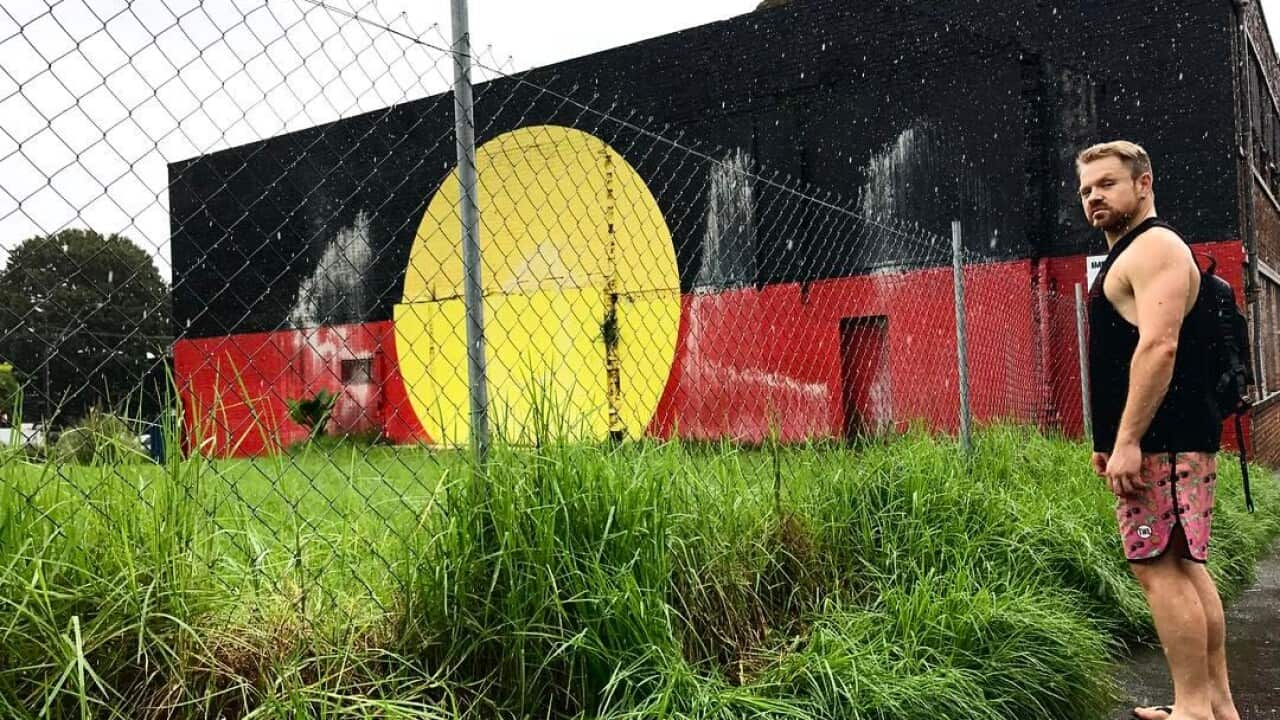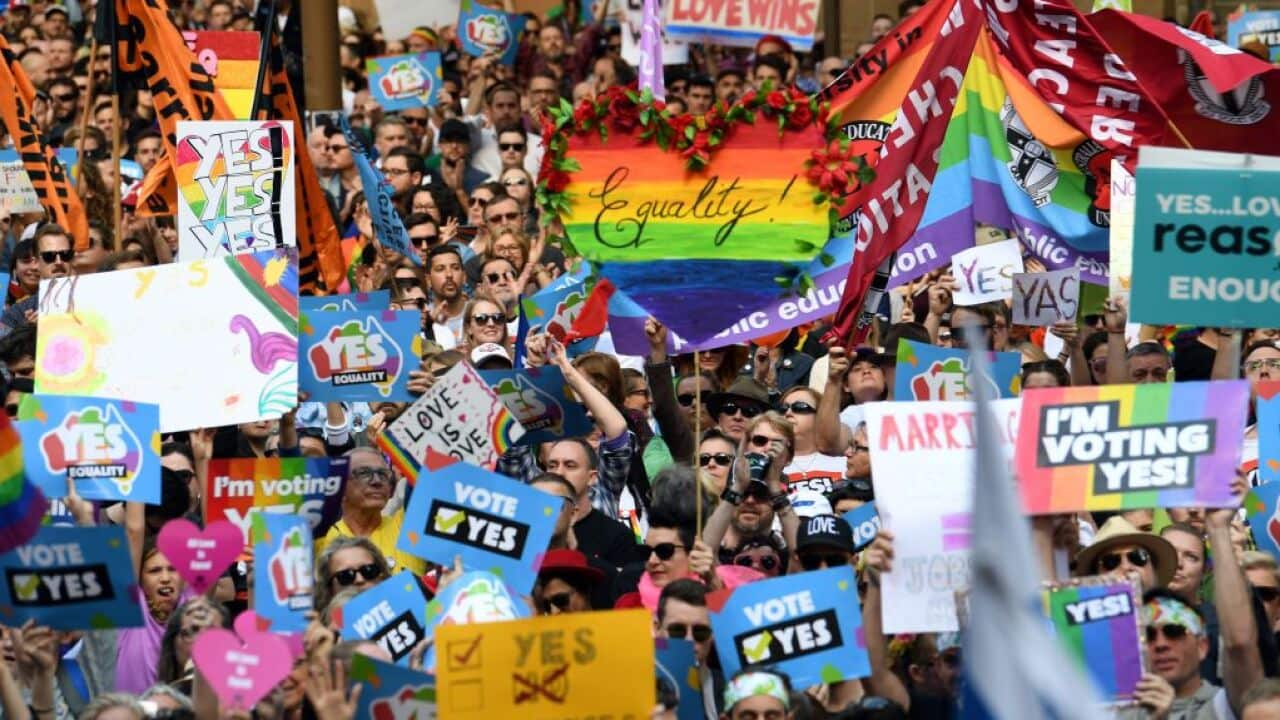Taking a deep breath and exhaling slowly, Will Cooper was overcome with emotion.
“We were all gathered around the kitchen and I just started crying when the vote showed Australia said YES. My reaction surprised everyone, even myself, I just wasn’t expecting to explode,” he exclaimed.
Feelings of pride and acceptance finally consumed Cooper, after months of having to endure what he described as a “dehumanising” survey process.
“I feel like in a way now we are all united with the Australian community and that there’s definitely been a positive impact from an interesting survey process.”
Blending LGBTQI and Indigenous communities
Now, the Wiradjuri and Yorta Yorta man is just about to launch his latest passion project: the ACT Aboriginal and Torres Strait Islander LGBTQI Network.
“In Canberra, there’s a large Aboriginal and Torres Strait Islander LGBTQI presence so I agreed to help create an event that would build a network to help support those that are both ATSI and LGBTQI.”
Mr Cooper, who's also the Indigenous Advisor at the Department of Health in the ACT, has been trying to raise awareness for his people for a long time but has now finally connected both his Indigenous and LGBTQI communities together.
“The event is all about raising awareness and supporting our community by celebrating all kinds of different representatives - be it from trans, young and Elders… to be able to have this event sold out is way above expectations and just proves the demand for more ATSI and LGBTQI networks."
The event kicked off with a Didgeridoo performance, Welcome to Country and panel discussion where four deadly network members, such as RUOK Ambassador and Wiradjuri man Jake Gablonski, shared experiences of being Aboriginal and Torres Strait Islander and LGBTQI. When it comes to diversity, Cooper says the problem is everyone is kept very separate.
When it comes to diversity, Cooper says the problem is everyone is kept very separate.

Jake Gablonski attending and speaking at the ACT Aboriginal & Torres Strait Islander LGBTI network launch! Source: NITV News
“It’s Aboriginal and Torres Strait Islander people over here while LBGTQI are over there — but at the end of the day we all want to be respected and to be understood, so that’s how the network came about,” he said.
“I noticed there was quite a gap in Canberra for services for both groups and it is my mission to help raise awareness for all people and organisations that should be providing more support to our people.”
Coming out
Looking back, Cooper says it’s been a long and interesting 32 years. When it comes to his Aboriginal heritage, he’s been comfortably immersed in that community his whole life, but he can’t say the same for his personal journey as a gay man.
“It’s been challenging — I only came out at the age of 29, so I feel like I’ve been finding myself and not just as a gay man, but a gay, fair-skinned Aboriginal man,” he said.
“Thinking back there were always signs that I was gay but it's amazing how much awareness I lacked growing up. Be it from denial [or] masculinity. I thought I had to play a certain role in our community and in my mob too.”
In his twenties, he identified as bisexual and then started to explore other sides of himself, but knew something wasn’t quite right.
“Three years ago I identified as a gay man. I wasn’t having much luck dating and going from men to women, so I wanted to really explore being gay properly.”
Once he finally found himself and happiness, the “difficulty of being gay” cleared.
“Initially, my mum wasn’t accepting… but she’s come a long way and has been very supportive, but it wasn’t easy. I was so scared about coming out to one of my uncles, I just wanted approval and he didn’t seem the type to understand.”
Balancing culture and sexuality
Meanwhile, being a fair-skinned Aboriginal man also made things even trickier.
“I felt I had a large family responsibility, (being essentially the only male in our Aboriginal family) so I had a lot of pressure to live up to those stereotypical values; to find a wife and carry on our family name and traditions,” he explained.
“Although it took time, my family are so supportive and I haven’t looked back ever since. Now my family and friends tell me that I’m a happier person and I really am,” he explained.
Now his main mission is to marry his two communities together, not only for himself but for all other people that face the same issues.
“What does it mean to be Aboriginal and gay? What can I do to help the LGBTI space now that I am confident in the Indigenous space and feel strongly about my community?”
Breaking down barriers
Cooper doesn’t feel like a stereotypical gay or Aboriginal man. Instead of playing footy, he power-lifts. He believes that by breaking preconceived misconceptions, he can help provide a voice for various communities.
“I feel like my life has been shaped largely by my identity within; culturally, physically, sexually. As a fair skinned Aboriginal man that used to be overweight, hitting 128kg, I struggled with my self-esteem and was bullied for being fat, and then having to deal with my sexuality as well.”
Despite how far Australia has come as a country, Cooper still feels like we have a long way to go in recognising Indigenous people and LGBTI people for who they are.
“I feel like I can add a voice by not being the stereotype because that stifles progress. So if I can help break preconceived notions, then I am doing the right thing. I have come a long way to accept who I am and it has taken me a long time to get here but I wouldn’t change that journey.”
Empowering the Next Generation
Now his aim is to be a black and gay role model for the next generation.
“I want to be the inspiration I never had. Growing up there never was a gay black man I could aspire to be like, or that empowered me and gave me advice,” he explained.
"My advice to my younger self would be, 'there will be terrible times, but you’ll always have an amazing community that will support you and you will get there'," he said.











